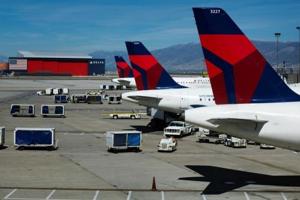Delta's refinery sacrifices profits for lower fuel cost

(Reuters) Delta Air Lines Inc. is flooding the New York market with jet fuel from its refinery, sacrificing refining profits in order to lower the carrier’s fuel costs, according to a company memo seen by Reuters.
The memo, written by the head of Delta’s Monroe Energy subsidiary, says the refinery will act against its own financial interest to try to maintain lower jet fuel prices and save the nation’s second-largest airline money on fuel, its top operating expense.
The unusual move, in a unique situation, adds to long-standing questions about Delta’s decision to purchase the Philadelphia refinery in 2012. Critics have argued that the entire industry benefits from lower jet fuel prices, giving Delta no advantage over its competitors for owning the refinery.
Jeff Warmann, who runs the refinery, told employees about the strategy in a July 27 memo. While weak jet fuel margins have hurt the refinery’s bottom line, they have also resulted in lower fuel costs for parent company Delta, Warmann argued.
“Normally with such low product prices, a merchant refiner would shift yields and production to other products. We plan to continue to produce jet fuel and pump it into the New York market, pressuring the price of jet fuel to even lower levels," Warmann wrote. "This negatively impacts our refinery economics, but greatly helps reduce Delta’s fuel cost.”
The 182 Mbpd refinery based in Trainer, Pennsylvania - about 10 miles southwest of Philadelphia - produces roughly 40 Mbpd of jet fuel, accounting for roughly 30% of the New York Harbor market, experts say. The memo does not say how long it plans on running with this strategy.
The New York Harbor market is the center of US jet fuel trading.
SUBSIDIZING RIVALS?
Ed Hirs, an energy economist at the University of Houston and longtime critic of the airline’s decision to buy the refinery, said at those levels Delta could influence the prices of jet fuel, but noted that its competitors like Southwest Airlines Co. and United Continental Holdings Inc. enjoy the benefit of those lower costs too, without the burden of running a refinery.
"They are using shareholder money to subsidize the other airlines," said Hirs.
Warmann's memo said the strategy cost the refinery about $30 M in the second quarter, which left it with a $10 M loss for the period, but he said it saved Delta about $100 M.
To put that in perspective, Delta reported net profit of more than $1.5 B in the quarter. Its overall adjusted fuel expense fell $408 M from the same quarter the year before, in spite of $614 M in losses on fuel hedges, a remnant of when prices were much higher. The airline has no fuel hedges for the rest of the year.
Three former commissioners of the US Commodity Futures Trading Commission, or CFTC, said in interviews with Reuters that Warmann’s comments would likely catch the attention of regulators, but that it is not uncommon for energy companies to try to influence commodity prices. They said companies get into trouble when they manipulate commodity prices and take market positions intended to take advantage of their influence.
Delta said the action was legal, and not manipulation.
“Delta has always said that the refinery is part of an integrated strategy aimed at managing our jet fuel costs. Ensuring supply and lowering fuel costs isn’t manipulation, it’s a natural consequence of owning the business. We are comfortable that our strategy is fully compliant with the law,” a Delta spokesman said Tuesday.
PRODUCTION CUT
In recent weeks, the refinery has cut production by nearly 25% to help trim high product inventories and weak margins, but nearly all of the cuts have been to gasoline and have not affected jet fuel output, a source told Reuters on Tuesday.
East Coast inventories of jet fuel were at 9.2 Mbbl last week, lower than at this time of year in the last five years, according to the US Department of Energy. Refining margins have been hurt by high inventories, causing some refiners to cut runs to trim stockpiles and boost profits.
Spot jet fuel prices fell below $1/gallon earlier this year, their lowest levels since 2009, according to the Energy Department.
An executive at a rival East Coast refinery said Tuesday that Delta may not be putting pressure on jet fuel prices at all, arguing the rising costs of renewable fuel credits, known as RINs, have played a much more important role in pressuring costs. The executive asked not to be named as he is not authorized to speak publicly for the company.
CREDITS
Refiners earn credits by blending biofuels like ethanol into gasoline and diesel or buying them in the open market, but jet fuel is exempt from the requirements.
The credits averaged about $0.78 apiece in the second quarter of 2016, about 25% above the same period a year ago. Jet fuel has sold at a discount against the distillate benchmark price that is roughly equal to the credit price.
Jet fuel's discount would be higher than the cost of renewable credits if Delta's strategy was successful, the executive argued.
"The reason jet is cheap isn't because of Delta, it's because of RINs pricing," the executive said.
After profitable years in 2014 and 2015, Delta's refinery lost $10 M in the second quarter, following a loss of $18 M in the first quarter, and the company expects the refinery to lose money this year.
In the memo, Warmann said the combination of high product inventories and the disappearance of cheap domestic crude has conspired to make the third and fourth quarters "very challenging."
Reporting By Jarrett Renshaw; Editing by David Gaffen and Bill Rigby






Comments